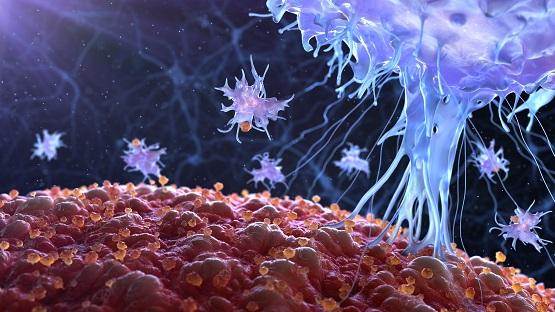
Credit: (C) iStock
A collaborative study led by Monash University’s Biomedicine Discovery Institute and the Olivia Newton-John Cancer Research Institute (ONJCRI) has uncovered new markers (HLA-associated peptides) that are uniquely present on melanoma tumours and could pave the way for therapeutic vaccines to be developed in the fight against melanoma.
Despite all improvements in melanoma treatment, every five hours one Australian dies because of the lack of effective treatment. A promising new approach harnesses the body’s own immune system to detect and kill tumour cells, through recognition of small tumour specific protein fragments (peptides) that decorate the surface of the tumour cells. The study, published in Cancer Immunology Research, a journal of the American Association for Cancer Research, has successfully identified thousands of peptides uniquely present on melanoma tumours that can be recognised by the immune system.
These observations have had an immediate clinical application, with the first clinical study on vaccination of melanoma patients using spliced peptides underway with collaborators at the Parker Institute for Cancer Immunotherapy, USA.
The study was co-led by Monash Biomedicine Discovery Institute’s Dr Pouya Faridi, Professor Anthony Purcell and Associate Professor Ralf Schittenhelm, and Drs Katherine Woods and Andreas Behren from the Olivia Newton John Cancer Institute.
“We considered how a melanoma tumour might ‘look’ to the human immune system, under different growth conditions. The sheer scope of melanoma peptides that we identified in this study, many of which have never been reported before, was both surprising and inspiring,” said Dr Woods.
Findings have shown that some of these melanoma peptide markers are generated from a process called splicing. In splicing, a protein is first cut into small pieces (peptides) and then two of these pieces are pasted together to make a “spliced peptide”. By identifying the exact spliced peptides, they can be synthesised outside of the body, then administered to patients to trigger the immune system into recognising and targeting tumours.
“The general goal of our study was to find new targets for melanoma treatment. We were unaware of the existence, prevalence and importance of these unique spliced peptides or if they could be recognised by the immune system. Now that we know they can, these peptides can be used as bait for the immune system to take action,” Dr Faridi said.
Dr Andreas Behren, Head Tumour Immunology Laboratory at ONJCRI said: “Our finding, that we can successfully identify spliced melanoma peptides that are immunogenic across different patients, is very exciting.”
Professor Purcell notes: “Based on these studies, spliced peptide antigens have moved from an immunological curiosity to a whole new class of actionable targets not just in melanoma but other cancers as well. Using Dr Faridi’s new workflow we have been able to shine a spotlight on this previously ignored class of peptides opening up a previously untapped resource for immunotherapy and cancer vaccination. Indeed, the ubiquitous nature of this splicing process point towards this class of antigens playing roles in infectious disease, autoimmunity and allergy.
###
Read the full paper in Cancer Immunology Research, a journal of the American Association for Cancer Research titled: “Spliced Peptides and Cytokine-driven Changes in the Immunopeptidome of Melanoma”
DOI: 10.1158/2326-6066.CIR-19-0894
About the Monash Biomedicine Discovery Institute at Monash University
Committed to making the discoveries that will relieve the future burden of disease, the newly established Monash Biomedicine Discovery Institute at Monash University brings together more than 120 internationally-renowned research teams. Spanning six discovery programs across Cancer, Cardiovascular Disease, Development and Stem Cells, Infection and Immunity, Metabolic Disease and Obesity, and Neuroscience, Monash BDI is one of the largest biomedical research institutes in Australia. Our researchers are supported by world-class technology and infrastructure, and partner with industry, clinicians and researchers internationally to enhance lives through discovery.
About the Olivia Newton-John Cancer Research Institute
The Olivia Newton-John Cancer Research Institute, as the La Trobe University School of Cancer Medicine, is a leader in the development of experimental and breakthrough cancer treatments. We investigate and develop treatments for cancers of the breast, bowel and gastrointestinal tract, lung, skin, prostate, liver and brain. Our researchers and clinician scientists lead clinical trials, giving patients access to potential new treatments including immunotherapies and personalised medicine. We are integrated within the Olivia Newton-John Cancer Centre, with research laboratories only metres away from where patients are cared for and receive treatment. This inspires and enables the rapid translation of our scientific discovery into clinical trials of new, better, cancer treatments.
http://www.
MEDIA ENQUIRIES
Wendy Smith – Media, Monash University
T: 0425 725 836 E: [email protected]
For more Monash media stories, visit our news and events site
Jaime Greenup – Media, Olivia Newton-John Cancer Research Institute
T: 0405 341 792 E: [email protected]
Media Contact
Wendy Smith
[email protected]
Related Journal Article
http://dx.




